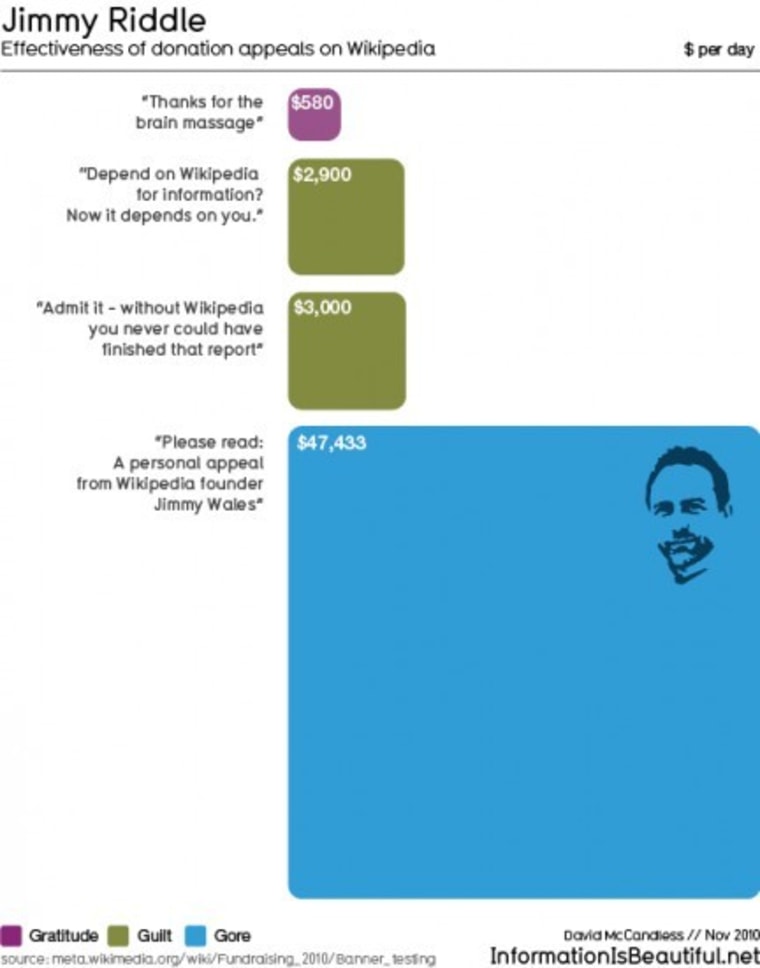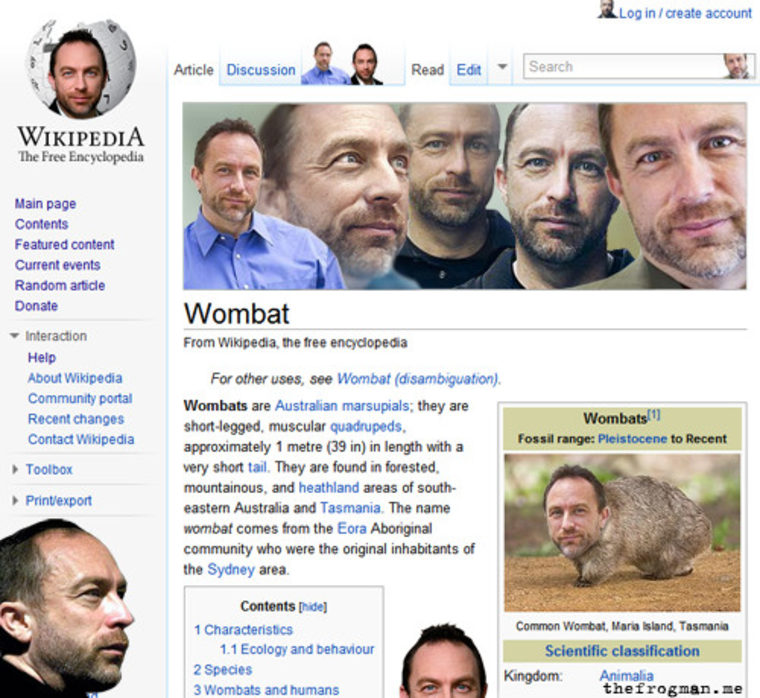Omnipresent banner ads featuring the icy stare of Wikipedia founder Jimmy Wales get most of the credit for what the site calls its "shortest fundraiser in Wikimedia history." Indeed, Operation JimboStare isn't just a hilarious meme — banners featuring Wales receive more than three times the clicks and larger donations compared to Wikipedia's donation-seeking ads.
Still, one wonders if Wales would've raised infinitely more money shaking coins from Mark Zuckerberg's couch instead of glaring his way into our nightmares.
The $16 million raised in Wikipedia's 2010 drive doubles the amount garnered in 2009, but it's chump change compared to the $500 million Goldman Sachs and a Russian investment firm just invested in Facebook. With this influx of cash, the world's largest social network is now valued at $50 billion. By comparison, last year Business Insider estimated Wikipedia's valuation at $5 million "if it tried to make money."
True, Wikipedia could be worth a lot more if it wanted to. It just doesn't want to — a non-goal that is both awesome and, in social media, rare.
"This outpouring of support by hundreds of thousands of ordinary people from all walks of life is a testament to the spirit of the Wikimedia movement," Wales said in a statement released over the weekend. "Wikipedia is a public resource created and maintained by hundreds of thousands of volunteers, relied on by over 400 million people and paid for by half a million donors. It's truly user-created, supported and maintained."
Despite the snooze-inducing quality of this standard-variety media press release chock full of humble gratuity and buzz words, Wales — or the publicist who probably wrote that statement — has a point. Given the comparatively low overhead, consider how much Wikipedia's honchos could be raking in had they gone the for-profit route. "Crowdsourced" means writers, copy editors, fact checkers, et. al. work for free. And for all the accuracy criticism Wikipedia receives, check out Wikipedia's transparent editing history and you'll see those free employees work like they're getting health insurance.
Now replace Jimbo's "personal appeal" with a banner ad paid for by Toyota or say, Zappos, and that's serious cash.
"If you assume a very conservative $5 per thousand page views — these would be very low ad rates — you get a potential revenue number of about $400 million," Business Insider wrote in its 2009 estimate of Wikipedia's possible advertising gains.
Wikipedia concurs. "Tens of millions of dollars could be generated if even just a few users allowed ads," states the site's Wikipedia: Advertisements entry. "With that money, the Wikimedia Foundation could increase server capacity, hire a larger staff, and improve various other Wikimedia projects such as Wiktionary and Wikinews."

This same detailed entry states clearly that advertising on Wikipedia is never off the table, and remains an ongoing discussion, including a 2008 quote from Wales:
While I continue to oppose the introduction of any advertising in Wikipedia, I also continue to agree that the discussion should evolve beyond a simple binary. I believe that if we looked at putting ads into the search results page (only), with the money earmarked for specific purposes (with strong community input into what those would be, either liberation of copyrights or support for the languages of the developing world). As the Foundation continues to evolve into a more professional organization capable of taking on and executing tasks, it begins to be possible to imagine many uses of money that would benefit our core charitable goals. Lest I be misunderstood: I am not saying anything new, but saying exactly what I have said for many years."
Wikipedia: Advertisements also includes detailed and massively hyperlinked sections both pro and con advertising on the site, stating in part:
"Revenue generated from advertisements could improve the website and help achieve its goals. On the other hand, advertising may be at odds with the mission of a neutral, non-profit website which aims to educate."
So there's that. But in the continually cash-strapped world of media, advertising is often the final answer. You can only have Jimmy Wales stare at you for so long before you tune it out and the amount of money you get from it diminishes.
Helen A.S. Popkin loves Wikipedia but no, she isn't going to marry it because of, you know, trust issues. Follow her on Facebook and/or Twitter to see how this relationship unfolds.
